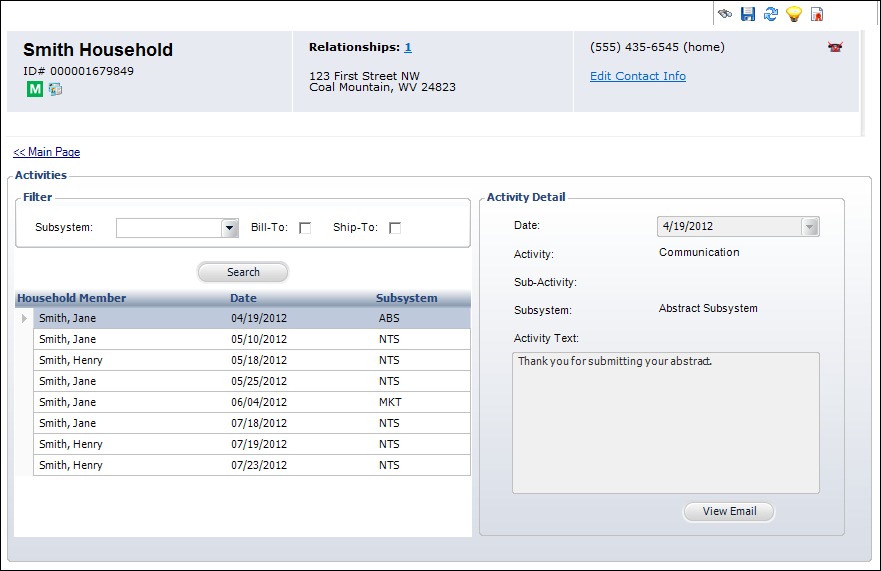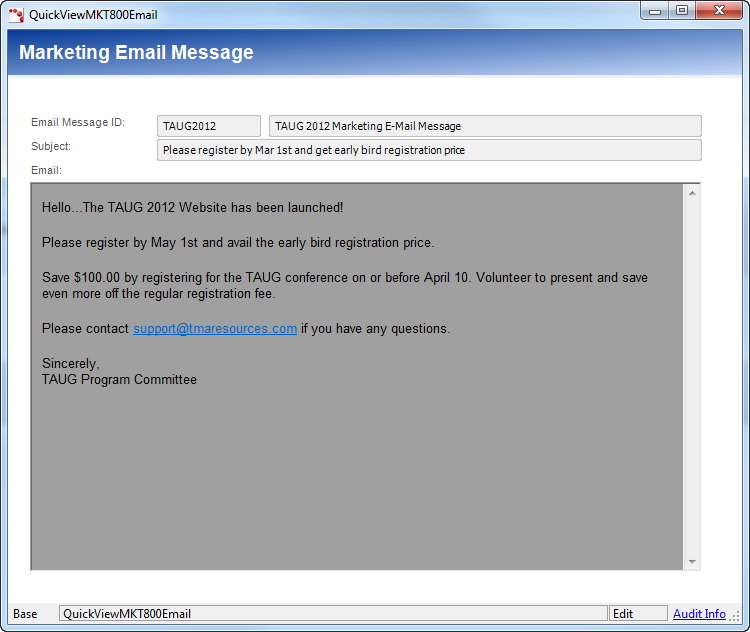 Only system activities with emails can be viewed from this screen. System activity records for the individual household members must be created from the constituent's record in CRM360®.
Only system activities with emails can be viewed from this screen. System activity records for the individual household members must be created from the constituent's record in CRM360®.From the Activities screen, you can track certain events that pertain to a constituent. These fall into two general categories – those that are auto-created by the system (activities) and those that are manually created by staff (contact tracking).
The primary examples of these system activities are:
· Email notification is sent (from the NTS system) to acknowledge an order, payment, change of address, or other system event.
· Mass email, fax, or physical mailing was sent (from the MKT system) for some purpose – fundraising campaign, meeting invite, update on a congressional hearing, and etc.
· Some organizations may choose to convert order or other data from an old system into Personify360’s activity table, so there is a record of that event but they do not need to capture all of the financials and other pieces of data required by the order tables.
· Some organizations may also decide to manually enter activity records to track certain circumstances – this is not a best practice (manual items should be entered as Contact Tracking) but the system allows that just in case.
· Some organizations use the system activities table to note activities that happen in integrated applications, such as DML and Higher Logic.
From this screen, the system displays all system activity records (i.e., where App_Code.OPTION_1 <> ‘Y’ where App_Code.SUBSYSTEM = ‘CUS’ and App_Code.TYPE = ‘ACTIVITY’ and App_Code.CODE = Cus_Activity.ACTIVITY_CODE) belonging to current household members (including the constituent record for the household).
 Only system activities with emails can be viewed from this screen. System activity records for the individual household members must be created from the constituent's record in CRM360®.
Only system activities with emails can be viewed from this screen. System activity records for the individual household members must be created from the constituent's record in CRM360®.
To view household member system activities in Household360:
1. From the Household Information task category in Household360, click System Activities.
The Activities screen displays, as shown below.

2. If necessary, use the options in the Filter section to sort through the list of constituent activities.
3. If the activity created was an email communication, click View Email to open the associated email. If you have integrated with Microsoft Outlook, the email will open in Outlook. If not, the email will open the Send E-Mail (APP140) screen.
 As of 7.4.1SP1, if the system activity is an email sent via MKT800, the Marketing Email Message window displays, as shown below. This window displays the email template used when the blast email was sent. Please note that if any columns were used in the email template, the customer data will NOT display in this window, as only the template is being displayed, not the actual email sent to the customer. Keep in mind that this window will always display the latest version of the email message template. Therefore, it is recommended that you do not update email message templates; instead, create a new email message template. For more information, please see Defining Email Marketing Messages.
As of 7.4.1SP1, if the system activity is an email sent via MKT800, the Marketing Email Message window displays, as shown below. This window displays the email template used when the blast email was sent. Please note that if any columns were used in the email template, the customer data will NOT display in this window, as only the template is being displayed, not the actual email sent to the customer. Keep in mind that this window will always display the latest version of the email message template. Therefore, it is recommended that you do not update email message templates; instead, create a new email message template. For more information, please see Defining Email Marketing Messages.

4. Click the Main Page link to return to the overview page, as shown below.
